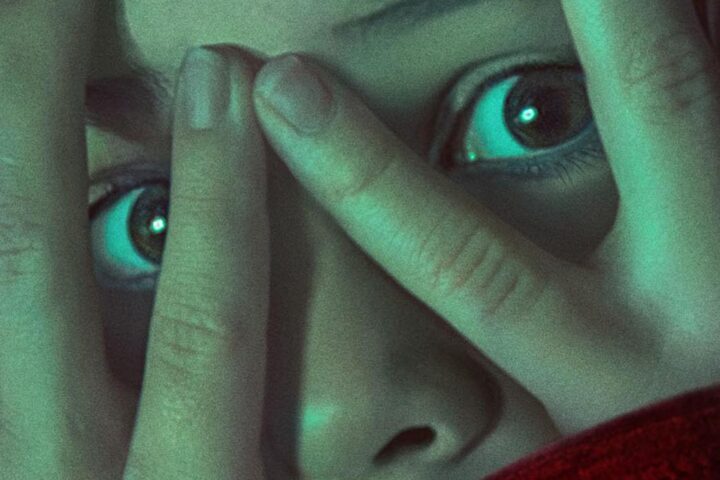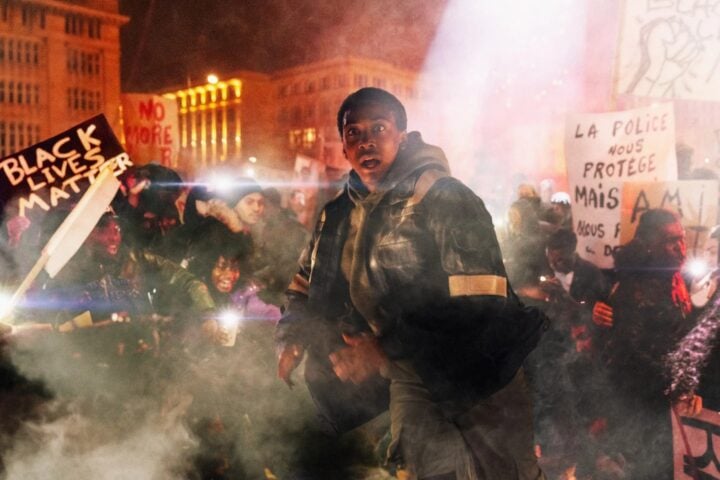After such high-profile flops as 2010’s The Wolfman and 2017’s The Mummy, the latter of which failed to launch Universal Pictures’s intended Dark Universe franchise, came a rare standout amid the studio’s ongoing project of rebooting its classic horror movies: Leigh Wannell’s The Invisible Man, which reframed the 1933 film (based on H.G. Wells’s novel) as an extreme case of stalking and gaslighting. While this ostensibly feminist spin on the story earned the film some appreciation, its pointed topicality was less compelling than Wannell’s masterful orchestration of suspense and, during the middle stretch, use of a single location.
Following that success, Wannell has been given the reins to Wolf Man, nominally based on the 1941 version with Lon Chaney Jr. that, along with its sequels, proved to be one of the most influential entries in Universal’s monster cycle. As with The Invisible Man, there isn’t much tying this new version to the original other than the title. In fact, Wolf Man retains almost none of the well-known lore around the werewolf. There’s nothing here about the full moon or a silver-handled cane, nor is the word “werewolf” even used. The most familiar and predictable notion is that someone who’s wounded by a werewolf and survives will become one.
In this case, it’s failed writer and family man Blake (Christopher Abbott), who gets clawed by one such creature early in Wannell’s film, at which point we begin to await his inevitable transformation. We’re somewhere in central Oregon, where Blake has taken his wife, Charlotte (Julia Garner), and daughter, Ginger (Matilda Firth), on a retreat to his father’s farmhouse. Blake’s father, Grady (played in flashbacks by Sam Jaeger), who’s been missing since 1995, has just been officially declared dead, so Blake heads up with his family to sort through the man’s things and, he hopes, revive his lifeless marriage in the wilderness.
For being a husband and father, Abbott’s character stands in marked contrast to Chaney’s hangdog loner from 1941’s The Wolf Man. But the attention the film pays to fatherhood—and its setting at the home of Blake’s father—is consistent with earlier takes on the story. The infanticidal aspect of Curt Siodmak’s script for the 1941 film is also present, and brazenly played up, in the 2010 remake, while writer-actor Paul Naschy’s long-running series of werewolf films always emphasized Waldemar Daninsky’s doomed lineage.
The theme gets muddled here, though, as the film contrasts Grady’s stern parenting with Blake’s gentler approach, with the idea being—as the infection takes hold—that he’s trying not to turn into his father. Third-act revelations telegraphed within the first few minutes are treated as big surprises as Wannell struggles to overcome the obviousness of his story construction.
More confounding, the wolfman design is more generally demonic than specifically lupine. Blake’s transformation—which for some reason sees him going bald even as his body hair grows—occurs gradually rather than recurrently, and the use of special makeup effects is convincing. Yet the film misses out on the rich gothic atmosphere traditionally mined for this genre, opting instead for murky compositions and a self-serious tone that robs the proceedings of any potential fun. Wolf Man neither embraces the fundamentals of the werewolf folklore from which it draws nor convincingly reinvents them, landing instead in somber, predictable territory, dully satisfied with a few cheap jump scares and a perfunctory nod to thematic resonance.
Since 2001, we've brought you uncompromising, candid takes on the world of film, music, television, video games, theater, and more. Independently owned and operated publications like Slant have been hit hard in recent years, but we’re committed to keeping our content free and accessible—meaning no paywalls or fees.
If you like what we do, please consider subscribing to our Patreon or making a donation.






